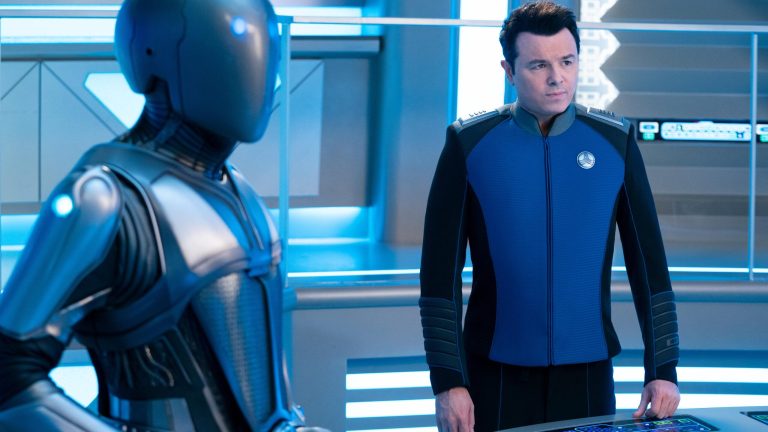The Orville: New Horizons Season 3 Episode 6 Review – Twice in a Lifetime
The third season so far has been filled with global political subtext and important morals, but “Twice in a Lifetime” gave audiences one of the most personal Orville stories in a long time.

This review of The Orville: New Horizons contains spoilers.
The Orville: New Horizons Season 3 Episode 6
When season 3 of The Orville started, it was difficult to tell in which direction it may head. It had been several years since the second season ended, it had changed networks, and even got a fresh new title. Now that we are more than half way through the season, Seth MacFarlane and his creative team have shown that those “New Horizons” mean that The Orville is clearly not finished finding itself. Season 2 was a massive shift in terms of tone and dramatic storytelling, and so far, season 3 seems to be pushing that dramatic envelope even more.
The first five episodes of the season have already dealt with heavy topics such as suicide, xenophobia, abortion, and gender identity. Yet MacFarlane always knew the true power of the show resided in the characters. “Twice in a Lifetime” proves that as one of the most personal and touching stories the show has told.
Lieutenant Malloy (Scott Grimes) is hosting a gathering in his quarters, and as the audience joins the party, we hear him playing a familiar song on his guitar. Malloy sings the song performed by Laura (Leighton Meester), a former “girlfriend.” Laura was introduced in last season’s “Lasting Impressions” where the crew of The Orville open up a time capsule from 2015, and Malloy becomes infatuated with Laura through the information left on her cell phone. He extrapolates and synthesizes what she would be like from her pictures, texts and emails, and in the end, falls in love with the simulation.
Ensign Burke (Anne Winters) finds the cell phone that Malloy had synthesized to text back and forth with the simulation of Laura. He begins to reminisce about his former love, but eventually, much like the “relationship,” he shakes it off with a smile and takes a selfie with Burke and Bortus (Peter Macon).
The next day, in the science lab, Lamaar (J. Lee) and Isaac (Mark Jackson) inform Captain Mercer (MacFarlane) about how they’ve seemingly perfected the “Aaronov Device,” a cone shaped mechanism that can create a temporal field. Lamaar shows everyone how they can now send something through time, demonstrating on Malloy’s egg salad sandwich and sending it 10 seconds into the past.
What was interesting about the chronological theory of this episode is how it really set up the fact there are no rules about time traveling. MacFarlane wrote the episode (which has been happening quite often this season) and it was a clever, albeit devious way of letting the audience know any paradoxes that might come up as a result of time travel are inconsequential. The egg salad sandwich was a perfect homage to the convenient Bill and Ted school of time travel, where Lamaar merely says, “I’m going to send this sandwich back 10 second from now” and it instantly appears.
While the episode was often shrunken down in scope, the opening act played like a blockbuster. The massive scope and stunning visual effects were on full display as The Orville was given a convoy of Union ships to escort them to a space station, where the Aaronov device would be safe. When they arrive, the station is destroyed, and a fleet of Kaylons begin attacking the convoy in order to take the device.
In the chaos, Malloy volunteers to run down to the lab to destroy it, to ensure a powerful tool like that is never in the hands of their enemies. As he does, The Orville unleashes a massive blast from their quantum drive to try and shake free from a Kaylon tractor beam, and Malloy is sent flying in a flurry of multi-dimensional time distortions.
After the escape, they realize that Malloy is missing, and as they begin to unravel what might have happened to him, they receive a message that has been traveling to their coordinates for nearly 400 years. It is Malloy. He has been sent back to 2015, is now trapped in time, and seeks rescue. In a tragic turn (yet foreseeable, considering MacFarlane’s warning that time travel is not an exact science) The Orville travels back only to miss their mark by about a decade. When they arrive in 2025 and find Malloy, he is already acclimated, and more importantly, has found the real Laura. The two of them are married, have a young son named Edward (Jackson Hill), and another child on the way.
The story is not about the massive, universal, political subtext that many of the previous episodes this season have dealt with, it is merely about Malloy’s family. It’s easily one of the most devastatingly emotional episodes the show has produced. Much like previous episodes, someone has to make a hard decision to do the right thing. Does Malloy give up his family and come back with his crew to the future? Does he take his family with him? Can Mercer allow any of that to happen? Those questions expertly drive the conflict between Mercer and Malloy, but ultimately don’t matter. That isn’t necessarily a criticism either. The thinly veiled morality of these questions are so foreign and outlandish to anyone watching that it becomes clear the science-fictional components aren’t meant to be relatable. It’s the dynamic between friends, and what these characters must do in an impossible situation, that are at the heart of this story.
Seeing Malloy tell Mercer to “shut up” and the resentment that Malloy feels being abandoned for a decade, only to have his friend say he has to leave, is captivating. Grimes perfectly conveys the pain and anger he feels towards the situation, and this episode is undoubtedly one of his strongest performances. MacFarlane as well, who has been flexing his surprisingly strong dramatic muscles this season, embodies the inner conflict he feels when his duty as an officer to protect the timeline clashes with his best friend’s happiness.
Fans may or may not enjoy the “road trip” B-plot with Isaac and Burke, but it was the perfect time for their story to evolve. The two (again conveniently) were the only ones who could mine for The Orville’s fuel, Dysonium, and so began a trek to find a deposit and drill for enough to get the ship home.
Yes, the script for this episode at times took one too many shortcuts. It wasn’t merely the time-travel science being swept under the rug, but Burke’s ability to “plot in four dimensions” has already been used as a crutch too often. While the two are being forced to work together, the audience is also forced to believe the contrivance that puts them side by side for this subplot to exist. The writing wasn’t necessarily as nuanced as the main storyline, but it did still have worthwhile moments. The house in which they eventually find the Dysonium appeared to be the same house Marty McFly’s family owned in Back to the Future, and even if it weren’t the actual house, that was a great homage to arguably the greatest time travel story put to film.
The thread of forgiveness in this subplot was dealt with in a much different way between Malloy and Mercer. Burke still harbors a deep seated hatred for Isaac and the Kaylons, and while he did extend an olive branch, and thanked her for the help she gave in the premiere, there’s clearly a lot of work left to be done before Burke sees Isaac as a separate entity from the Kaylon collective. As mentioned, while it certainly isn’t the strongest aspect of the story, the character dynamic between Burke and Isaac did need to progress, even if it is merely baby-steps at this point.
“Lasting Impressions” has been a fan-favorite episode ever since it debuted, and that is undoubtedly because fans love to see Malloy happy. “Twice in a Lifetime” is a devastating follow-up. Malloy had what he always wanted, with his dream woman, and many viewers, including this reviewer, shared his anger when he was being forced to give it up – timeline be damned. The conclusion of the episode felt like a gut-punch simply because of how conveniently it was wrapped up, drama swept under the rug for a return to the aforementioned affableness and everyone forgiving themselves and each other (aside from Burke maintaining her hatred). It felt like a disservice to the writing up to this point.
“Twice in a Lifetime” will certainly be remembered for conveying the same level of heartache which made “Lasting Impressions” such a highlight of season 2. It was a brilliant examination of Mercer and Malloy’s friendship, it challenged us as viewers, and while it had massive battle sequences, passionate make-out sessions between lead characters, and glittering time travel effects, it will be remembered for its smaller, more intimate moments. Moments where we realized, it’s not the Dysonium that runs The Orville, it’s the characters we care about.
